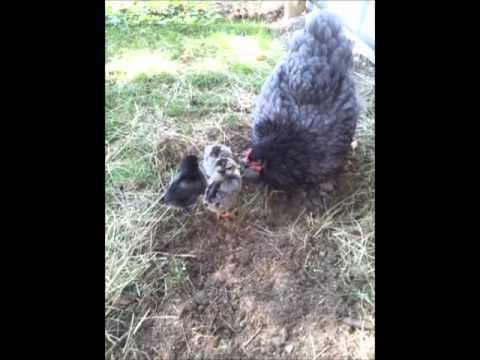- Apr 19, 2013
- 1,955
- 257
- 231
I have a little Silkie pullet, 7 months old that seems to be quite broody. I hadn't appreciated the implications of being broody before. I never see her out of the nest box anymore. I pick her up several times a day and put her outside beside water and food. Sometimes she eats or drinks, sometimes she just squats their flattened like a pancake. Usually, her crop is empty. I think she is dropping weight. (I'll start weighing her today.) I don't know if she is laying any eggs, but I often find an egg or two under her. They might be other pullets' eggs and she just chooses to sit in the nest box with the most eggs when she goes back after I've lifted her outside.
What do I do with her? Is she likely to always be especially broody? Is she likely to be a very good candidate to hatch eggs or adopt new chicks? I'm a bit worried for her health. I don't care if she is not producing eggs.
I bought these Silkies (hatchery chicks of dubious quality) just because my avian vet told me they were so friendly and adorable. I hadn't thought about using them as a broody, but now I will let them hatch some Americauna eggs next year. I don't think I need seven Silkie pullets for that. What percentage of Silkies will successfully hatch eggs? I would like to use a Silkie to raise some day-old chicks that I've ordered for next year. The chicks will be two days old when they arrive in the mail. Is that feasible? How do I choose which Silkie to try to be the mother for the chicks?
I am thinking of finding homes for a few of my Silkie pullets with one of my husband's co-workers who will make them a combination of egg producer and pet for their children. I'm trying to go through the seven pullets and decide which ones I could make available. I've already decided to keep the Silkie that has protective rooster traits and comes running over to bite me if I mess with her girls--that's not going to be a fun bird for a pet. Another I'll keep because I like the color. I think I should keep this broody one, too, since she is not likely to produce many eggs or be fun for kids. Does that make sense or are the rest just as likely to be as broody as she is? I want to give them two or three pullets that are my best egg layers if I can figure out who they are. Thoughts please.
Thanks.
What do I do with her? Is she likely to always be especially broody? Is she likely to be a very good candidate to hatch eggs or adopt new chicks? I'm a bit worried for her health. I don't care if she is not producing eggs.
I bought these Silkies (hatchery chicks of dubious quality) just because my avian vet told me they were so friendly and adorable. I hadn't thought about using them as a broody, but now I will let them hatch some Americauna eggs next year. I don't think I need seven Silkie pullets for that. What percentage of Silkies will successfully hatch eggs? I would like to use a Silkie to raise some day-old chicks that I've ordered for next year. The chicks will be two days old when they arrive in the mail. Is that feasible? How do I choose which Silkie to try to be the mother for the chicks?
I am thinking of finding homes for a few of my Silkie pullets with one of my husband's co-workers who will make them a combination of egg producer and pet for their children. I'm trying to go through the seven pullets and decide which ones I could make available. I've already decided to keep the Silkie that has protective rooster traits and comes running over to bite me if I mess with her girls--that's not going to be a fun bird for a pet. Another I'll keep because I like the color. I think I should keep this broody one, too, since she is not likely to produce many eggs or be fun for kids. Does that make sense or are the rest just as likely to be as broody as she is? I want to give them two or three pullets that are my best egg layers if I can figure out who they are. Thoughts please.
Thanks.






